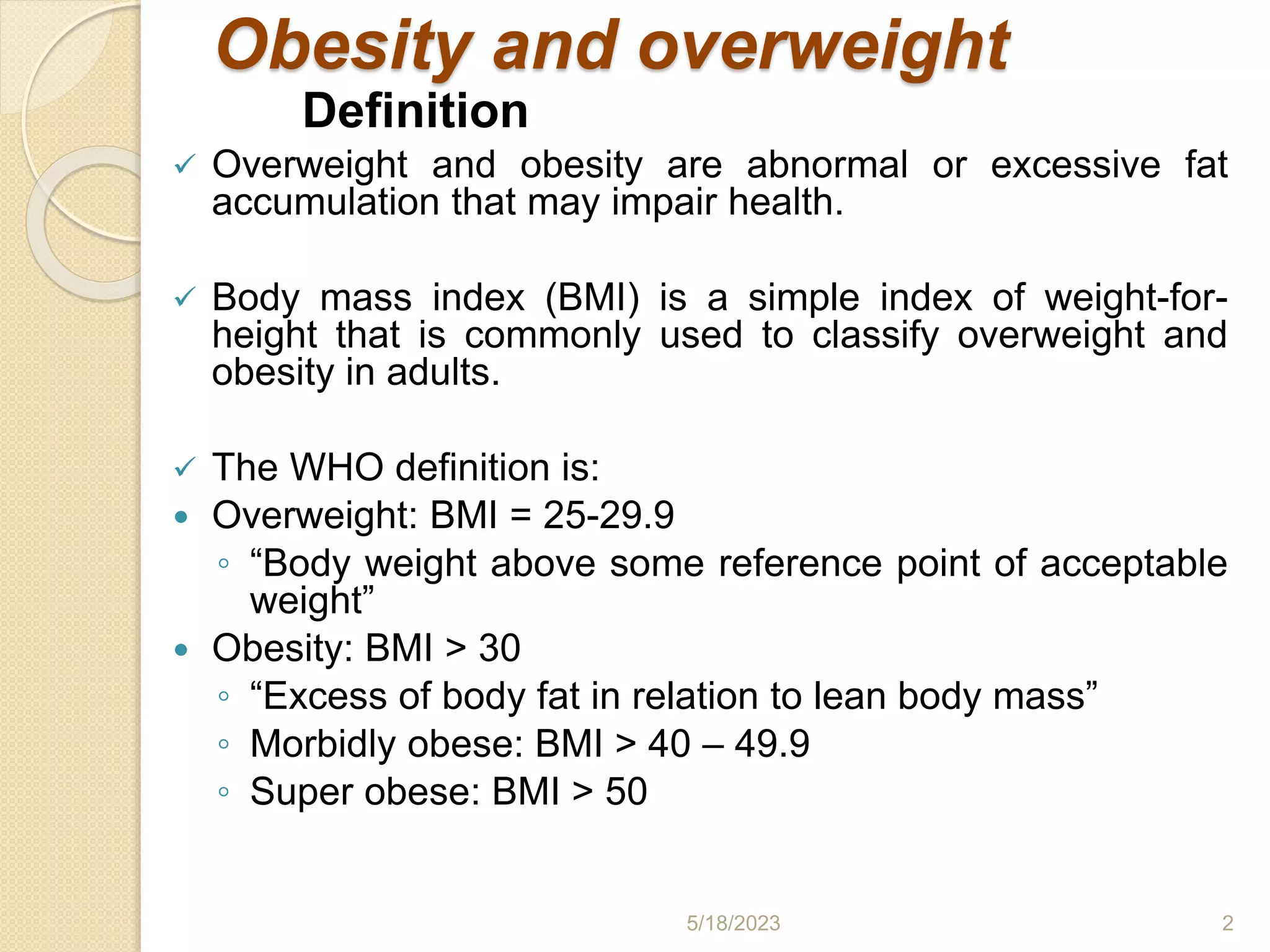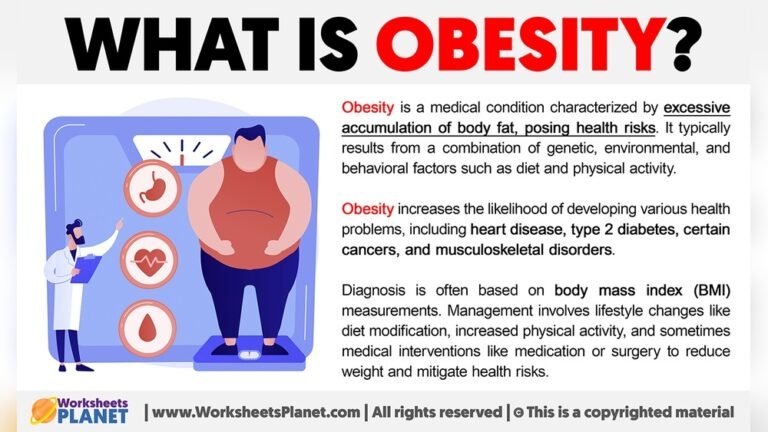When you hear the word “obesity,” what comes to mind? Is it just a number on the scale or something deeper?
Understanding the true definition of obesity is more important than you might think because it affects how you approach your health and well-being. Obesity isn’t simply about weight—it’s about how excess fat impacts your body and your life. You’ll discover what obesity really means, why it’s more complex than just BMI, and how different types of obesity can affect you differently.
Keep reading, because knowing the facts about obesity could change the way you think about your health—and your future.

Credit: mexicobariatriccenter.com
Defining Obesity
Obesity is more than just extra weight. It involves having too much body fat that can harm health. Understanding obesity starts with clear definitions. These definitions help identify risks and guide care. This section explains what obesity means medically, how body fat affects health, and how experts classify obesity.
Medical Descriptions
Doctors describe obesity as a chronic disease. It occurs when excess fat builds up in the body. This fat can cause damage to organs and tissues. The condition often results from factors like genes, diet, and lifestyle. Obesity increases the chance of illnesses such as diabetes and heart disease.
Body Fat And Health Risks
Not all body fat is equal. Excess fat around the belly is more harmful than fat in other areas. This type of fat raises the risk of health problems. High body fat can lead to high blood pressure and insulin resistance. Reducing body fat can improve overall health and reduce risks.
Classification By Bmi And Fat Distribution
Body Mass Index (BMI) is a common tool to classify obesity. It uses weight and height to estimate body fat. A BMI over 30 usually indicates obesity. Doctors also look at fat distribution to assess risk. Measuring waist size helps determine if fat is mostly around the abdomen.
Metabolic Phenotypes
Obesity is not the same for everyone. It varies based on how the body controls hunger, digestion, and energy use. These differences are called metabolic phenotypes. Understanding them helps explain why people gain weight in different ways. It also guides more effective treatments for obesity.
Hungry Brain
The “Hungry Brain” phenotype means the brain sends strong hunger signals. People feel hungry even after eating enough. This can lead to overeating and weight gain. The brain struggles to recognize fullness and controls appetite poorly.
Hungry Gut
“Hungry Gut” describes a digestive system that sends hunger signals too quickly. The stomach empties fast, causing early hunger between meals. This leads to frequent eating and extra calorie intake. The gut hormones that control appetite are imbalanced.
Emotional Hunger
Emotional Hunger happens when feelings drive food cravings. Stress, sadness, or boredom trigger eating for comfort. This type of hunger is not about physical need. It often leads to eating unhealthy, high-calorie foods and weight gain.
Slow Burn
The “Slow Burn” phenotype means a slow metabolism. The body burns calories at a lower rate. Even normal eating can cause weight gain. People with this type may feel tired and have low energy. Their bodies store fat more easily.
Causes Of Obesity
Obesity happens when the body stores too much fat. This condition can harm health. Many factors cause obesity. Understanding these helps in prevention and treatment. Causes include genes, surroundings, and personal habits.
Genetic Factors
Genes affect how the body stores fat. Some people inherit a slow metabolism. This means they burn fewer calories. Genes also influence appetite and cravings. Family history can increase obesity risk. Not everyone with these genes becomes obese, but risk grows.
Environmental Influences
Where people live affects their weight. Easy access to unhealthy foods leads to overeating. Lack of safe places to exercise limits activity. Advertising often promotes high-calorie foods. Work and school environments may encourage sitting too long. These factors can push people toward obesity.
Lifestyle Choices
Daily habits shape body weight. Eating large portions or fast food adds extra calories. Skipping physical exercise causes fewer calories to burn. Poor sleep affects hormones that control hunger. Stress can lead to emotional eating. These choices directly impact obesity development.

Credit: www.slideshare.net
Common Myths
Obesity is often misunderstood because of many common myths. These myths create confusion about its causes and treatment. Clearing up these false ideas helps us see obesity more clearly. Understanding what obesity really is can improve health decisions and support.
Obesity Is Only About Willpower
Many believe obesity happens because of a lack of willpower. This idea is too simple. Obesity involves genetics, hormones, and environment. People cannot just “try harder” to lose weight. It is a complex condition, not just a personal failure.
All Fat Is Harmful
Fat in the body is not always bad. The body needs fat for energy and protection. Some fat types are healthy and essential. Problems arise when excess harmful fat builds up around organs. Not all fat causes health risks.
One-size-fits-all Treatments
Treatments for obesity do not work the same for everyone. Each person has unique reasons for weight gain. Some need diet changes, others need medication or surgery. Personalized plans offer better results than a single approach.
Health Implications
Obesity affects more than just body weight. It has serious effects on overall health and quality of life. Understanding these health implications helps in recognizing why obesity needs attention and care.
Excess fat in the body can lead to many health problems. These problems affect the heart, lungs, joints, and other organs. Obesity also plays a role in mental well-being, which is often overlooked.
Chronic Conditions Linked To Obesity
Obesity raises the risk of many chronic diseases. These include type 2 diabetes, heart disease, and high blood pressure. Excess fat causes inflammation, which harms blood vessels and organs.
Joint problems like osteoarthritis often develop due to extra weight. Sleep apnea is another common condition linked to obesity. It causes breathing difficulties during sleep, leading to fatigue and other issues.
Impact On Mental Health
Obesity affects mental health in many ways. People with obesity may face low self-esteem and social stigma. These feelings can lead to depression and anxiety.
Body image issues are common, especially among young people. Stress and emotional eating may worsen weight problems. Mental health support is important for overall well-being.
Metabolically Healthy Vs Unhealthy Obesity
Not all obesity cases have the same health risks. Some people with obesity do not have typical metabolic problems. This condition is called metabolically healthy obesity.
Others have metabolic unhealthy obesity, with risks like insulin resistance and high cholesterol. Understanding this difference helps doctors tailor treatments better. Both types still need attention to prevent future health problems.

Credit: www.youtube.com
Approaches To Treatment
Treating obesity requires a mix of approaches tailored to each person. This condition results from many causes, including diet, activity level, and genetics. Effective treatment plans often combine lifestyle changes with medical support. Understanding different methods can help manage obesity better and improve health outcomes.
Diet And Nutrition Strategies
Eating habits play a key role in obesity treatment. A balanced diet with fewer calories helps reduce body fat. Focus on whole foods like vegetables, fruits, and lean proteins. Avoid sugary drinks and processed snacks. Portion control also supports weight loss. Nutrition plans should fit individual tastes and lifestyles to be sustainable.
Physical Activity And Exercise
Regular exercise boosts calorie burn and improves metabolism. Activities like walking, cycling, or swimming help reduce weight and strengthen the heart. Aim for at least 150 minutes of moderate exercise each week. Exercise also supports muscle growth and mental well-being. Combining movement with diet enhances long-term success.
Medical And Surgical Options
Sometimes lifestyle changes are not enough for severe obesity. Doctors may recommend medications to control appetite or improve metabolism. In certain cases, surgery like gastric bypass or sleeve gastrectomy is an option. These procedures reduce stomach size to limit food intake. Medical treatments require careful monitoring and follow-up care.
Personalized Treatments By Phenotype
Obesity varies by individual biology and behavior. Four main phenotypes include hungry brain, hungry gut, emotional hunger, and slow burn. Each type responds differently to treatments. Personalized plans target specific causes like appetite signals or metabolism. This approach improves treatment effectiveness and patient satisfaction.
Prevention And Lifestyle
Prevention and lifestyle play a key role in managing obesity. Small, consistent changes in daily habits help maintain a healthy weight. A balanced approach focuses on eating well, staying active, and supporting emotional health. These steps reduce the risk of obesity and improve overall well-being.
Healthy Eating Habits
Eating nutritious foods in the right amounts supports healthy weight. Choose fruits, vegetables, whole grains, and lean proteins. Avoid excessive sugar, salt, and processed foods. Drinking plenty of water also helps control appetite. Regular meal times prevent overeating and stabilize energy levels.
Regular Physical Activity
Exercise burns calories and builds muscle. Aim for at least 150 minutes of moderate activity each week. Activities can include walking, cycling, swimming, or dancing. Physical activity boosts metabolism and improves heart health. Staying active also reduces stress and enhances mood.
Behavioral And Emotional Support
Emotional health impacts eating and exercise habits. Stress, anxiety, or depression can lead to overeating. Seek support from friends, family, or professionals. Counseling or support groups help develop healthy coping skills. Positive mindset and motivation increase success in weight management.
Conclusion
Obesity means having too much body fat that harms health. It is not just about weight or appearance. Many factors like genes, environment, and habits affect it. Different types of obesity show how hunger and metabolism vary in each person.
Understanding these helps in choosing better treatments. Staying informed and making healthy choices can improve life quality. Everyone’s body is unique, so care should be personal and kind.


